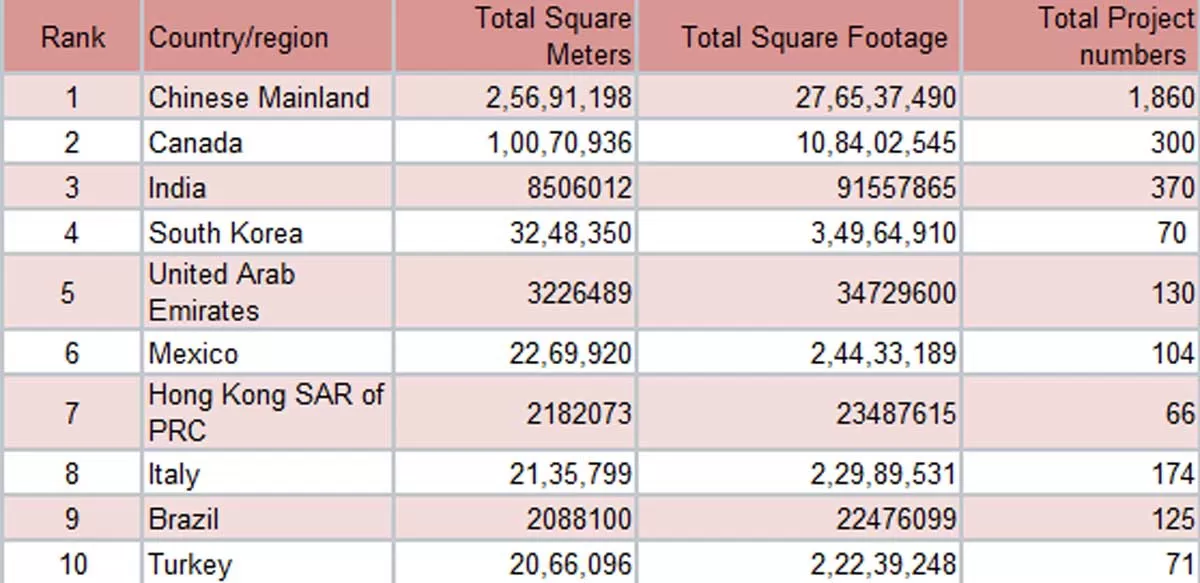India retained its third spot on U.S. Green Building Council’s (USGBC) annual list of Top 10 Countries and Regions for LEED (Leadership in Energy and Environmental Design) in 2024. 370 projects, across both buildings and spaces, were certified for LEED in the country covering 8.50 million gross square meters (GSM) (91.5 million square feet). China topped the top 10 rankings for 2024 with over 25 million GSM certified followed by Canada with 10 million GSM. The annual ranking by USGBC highlights the significant progress made by countries and regions outside the United States in adopting healthy, sustainable and resilient building design, construction and operations.
This year marks the 25th anniversary since USGBC launched the LEED rating system. Since its establishment in 2000, USGBC’s LEED metrics-based system has set the standard for rating and promoting healthy, resilient, sustainable, and efficient buildings. It has become the world’s most widely used green building program while empowering the sector to decarbonize. USGBC is finalizing its later iteration of the rating system–LEED v5. The final version will be released later this year and will reflect the feedback received from the community.
India has consistently ranked among the top three countries for LEED certifications, underscoring its dedication to achieving the United Nations’ Sustainable Development Goals (SDGs) for 2030. The ranking reflects India’s focus on combating climate change and promoting environmentally conscious practices through green development initiatives. LEED certifications in India are managed by the Green Business Certification Inc. (GBCI), which works to accelerate the adoption of green buildings nationwide.
Commenting on this milestone, Gopalakrishnan Padmanabhan, Managing Director – Southeast Asia & Middle East, GBCI, said, “India’s remarkable achievement of 370 LEED-certified projects in 2024 highlights the country’s steadfast commitment to sustainable development and climate action. With 8.50 million GSM of green certified space, India is not only addressing the growing need for sustainable urban infrastructure but also making significant strides towards achieving the United Nations’ SDGs for 2030.
As the nation continues to expand its urban footprint, the adoption of green building practices will be central to improving community well-being and mitigating climate change. India’s on-going push for net-zero emissions by 2070 further solidifies its leadership in the global movement for a sustainable future.”
The list is compiled based on data and analysis of LEED-certified Gross Square Meters (GSM) space as of in 2024. While the United States is not included in the list, it remains the world’s largest market for LEED with more than 56 million GSM certified during the year.
In 2024, LEED-certified projects in India saw significant growth, with Operations and Maintenance (O+M) leading the way, accounting for 153 projects, followed by Interior Design and Construction (IDC) with 102 projects, and Building Design and Construction (BDC) with 61 projects. Notable projects certified under LEED v4.1 O+M included 57 locations from retail giant Dmart. In terms of sector growth, Grade A office spaces dominated registrations in 2024 with 455 projects covering 185 million square feet.
Other significant sectors included retail (80 projects with 23 million sq ft), industrial manufacturing (71 projects with 12 million square feet), residential (33 projects with 10 million sq ft), and lodging (22 projects with 7 million square feet).
Key trends for 2024 revealed a rise in interest from developers and corporate leaders pursuing LEED EBOM for sustainability performance tracking and internal reporting. Many large-scale mixed-use developments and IT campuses are exploring LEED for Cities & Communities and TRUE certifications for better waste management. India added 345 new LEED professionals and 12 LEED Fellows in 2024. This growth reflects India's expanding real estate market and commitment to achieving net-zero emissions by 2070 through LEED Zero and LEED EBOM certifications.
India’s growing real estate market is increasingly aligned with sustainable practices. The expansion of LEED certifications beyond commercial spaces to industrial, residential, and educational sectors underscores the country’s commitment to its net-zero targets and sustainable growth. As LEED continues to evolve, India remains a global leader in green building practices, inspiring other nations to prioritize sustainability in their built environments.





















